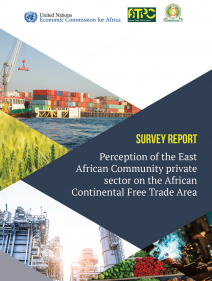Three years after its signing, AfCFTA is expected to connect 1.3 billion people across 55 countries with a combined gross domestic product valued at US$3.4 trillion. The successful implementation is dependent on putting in place significant policy reforms and trade facilitation measures. This report documents the main findings of a survey undertaken on the EAC private sector on how it perceives the opportunities, constraints and policy reforms needed to maximize the benefits of AfCFTA. Among the findings, an important share of respondents to the survey reported low awareness of AfCFTA, status of implementation, its benefits, as well as the level of political will. Findings also show that there is slow intra-Africa trade, with a high dependence on Asian and European markets. On the contrary, respondents manifest a willingness to invest in the rest of the African regions but are limited by various unharmonized fiscal and regulatory policies that would lead to slow implementation of the Agreement Establishing the African Continental Free Trade Area. Furthermore, it is worth noting from the findings that, due to the outbreak of COVID-19, the private sector in the EAC region has been adversely affected, thereby leading to low interconnectivity with the rest of the continental trade and investment counterparts between EAC and the rest of the world.
Share this:
Release Date:
14 May, 2021
© United Nations Economic Commission for Africa

